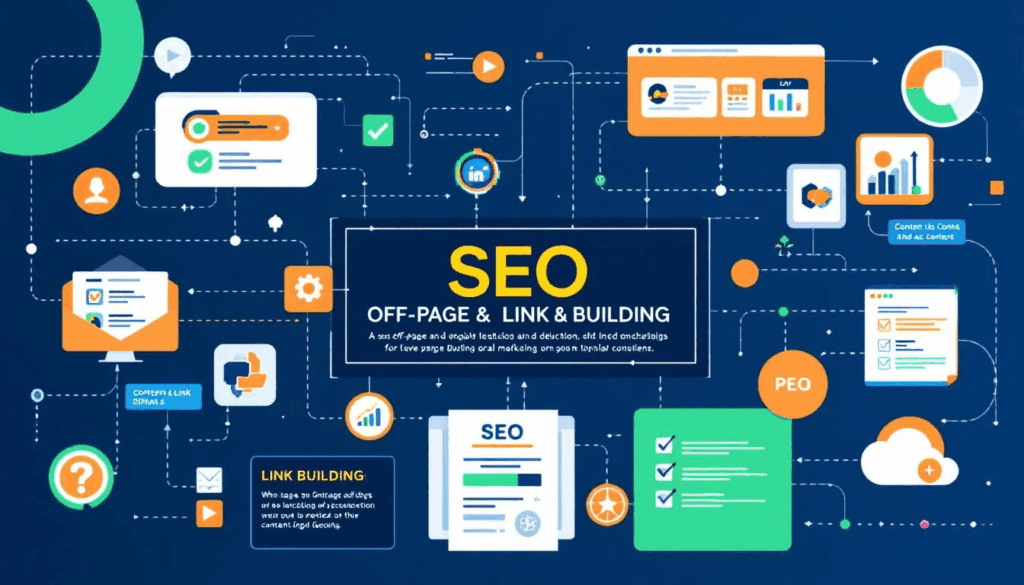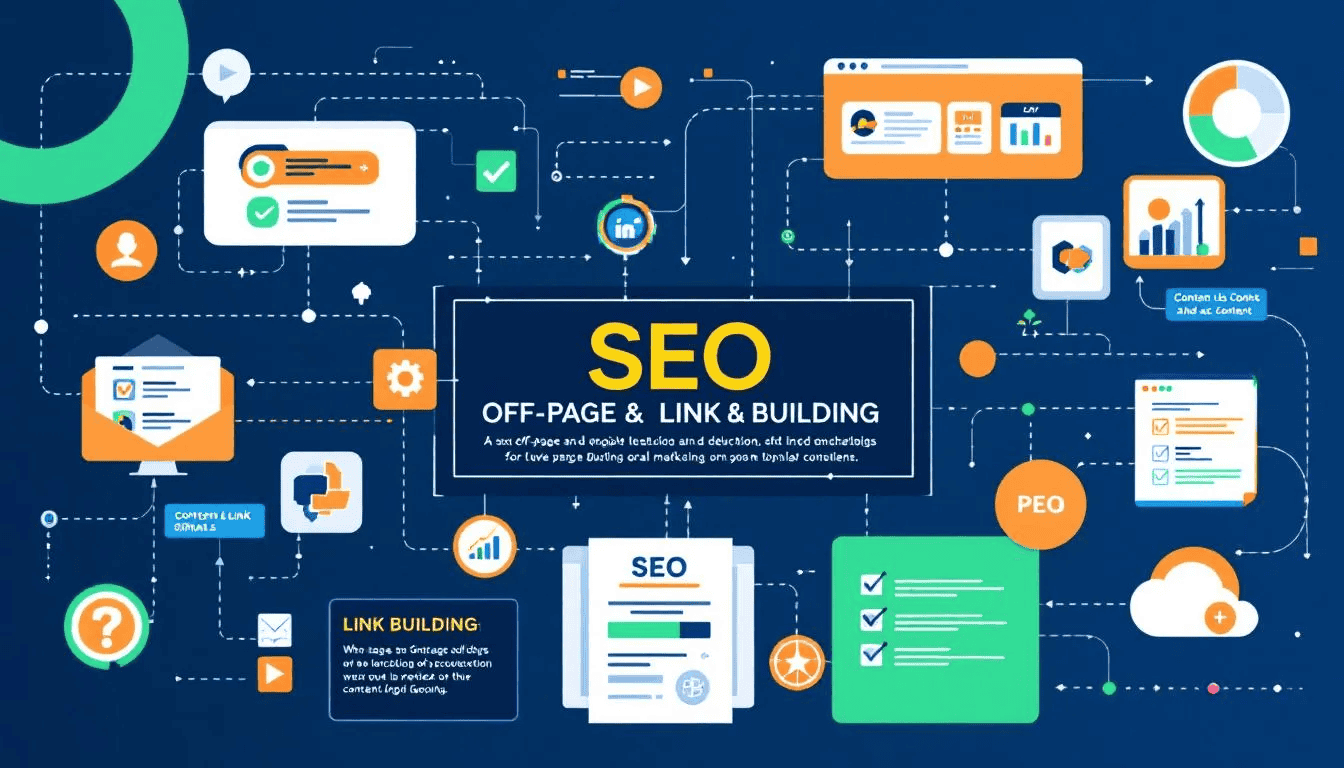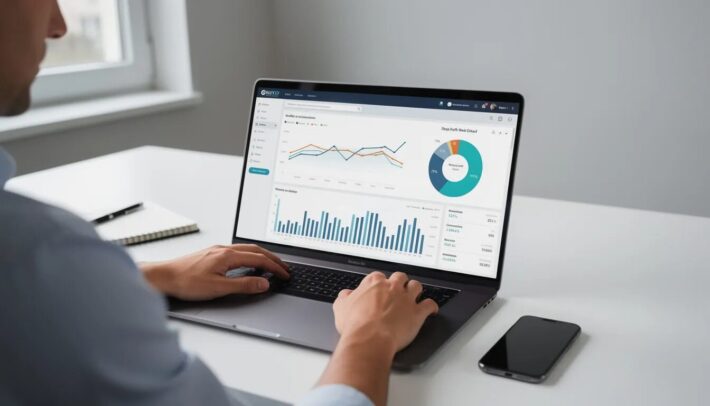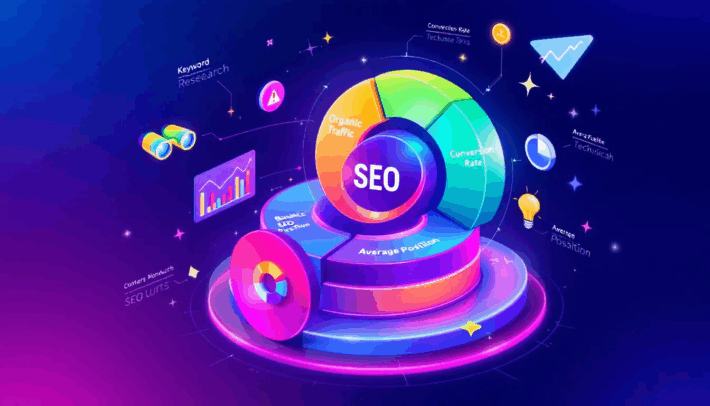Top Strategies for Improving Search Engine Positioning SEO

Search engine positioning SEO is all about getting your web pages to rank higher in search engine results. If you want more visibility and organic traffic, understanding this process is crucial. This article breaks down key strategies to improve your site’s search engine positioning.
Key Takeaways
Effective search engine positioning requires a targeted approach focused on individual pages for better visibility and user engagement.
Key elements such as thorough keyword research, creating high-quality content, and effective internal linking strategies are essential for improving search engine rankings.
Regular updates to existing content, efficient use of tools like Google Search Console, and a solid off-page SEO strategy are vital for maintaining long-term search engine visibility.
Understanding Search Engine Positioning

At the heart of achieving online visibility lies the concept of search engine positioning. This process involves optimizing specific pages of your website to rank higher in search engine results for targeted keywords and queries. Unlike broader SEO strategies that encompass site-wide improvements, page’s search engine positioning zeroes in on individual pages, aiming to boost their visibility and engagement with users searching for relevant topics. This targeted approach can significantly influence your site’s overall success by ensuring that your most important content reaches its intended audience.
However, it’s essential to recognize that keyword rankings are not static. They can fluctuate due to various factors, including changes in search engine algorithms and competitors’ SEO efforts. Regularly tracking these rankings is crucial to maintaining or improving your search engine visibility. Utilizing tools like Google Search Console can provide valuable insights into your site’s performance, helping you stay ahead of the curve.
Moreover, understanding impressions—the number of times your site appears in search results—can serve as an early indicator of your SEO success. As your search engine positioning efforts start to pay off, you’ll notice an increase in impressions, signaling that your content is gaining traction and visibility on search engine results pages.
Importance of Search Engine Positioning in SEO

Search engine positioning is a necessity in search engine optimization. Without proper positioning, your website might as well be invisible to potential users. Achieving a higher search engine position conveys trust and credibility, establishing your website as an authority in its niche. This trust is crucial for influencing users’ opinions and enhancing brand perception. Search engine positioning important is a key factor in achieving these goals.
Moreover, a high search engine ranking can lead to increased traffic, generating more leads and potential revenue for your business. Even a small improvement in your search engine position can have a significant impact. Increasing your rank by just one position on the search engine results page can lead to a rise in click-through rates. On average, this improvement is about 2.8%. This increase in visibility not only drives more traffic but also enhances your chances of being chosen by consumers over your competitors, ultimately improving your search result.
Effective search engine positioning can secure high placements in search results, increasing the likelihood of clicks and further supporting your competitive advantage. By consistently working on your paid search and search engine positioning efforts, you can ensure long-term visibility growth and establish a successful online presence through search engine placement.
Key Elements of Search Engine Positioning
Mastering search engine positioning requires a strategic combination of several key elements. These include thorough keyword research and selection, the creation of high-quality content, and the implementation of effective internal linking strategies in search marketing. Each of these components plays a vital role in improving your website’s visibility and ensuring that your content reaches the right audience.
Keyword Research and Selection
Keyword research forms the foundation of a successful search engine positioning strategy. It is essential for achieving high visibility online. Identifying relevant keywords that align with your target audience’s search intent is crucial for achieving higher search engine rankings. Tools like Google Keyword Planner and Surfer Keyword Research can assist in identifying high-traffic keywords relevant to your niche, helping search engines understand your content better and improving your search engine rankings.
Selecting the right keywords involves more than just identifying high-traffic terms. It also requires understanding the competition and optimizing for specific keywords and keyword phrases that can lead to easier positioning. Regularly reviewing and updating your target keyword usage strategy is essential for staying ahead in the ever-changing digital landscape. This continuous optimization ensures that your content remains relevant and competitive, ultimately leading to higher search engine positioning.
Creating content marketing with relevant keywords that users search for contributes positively to your search engine positioning efforts. By providing more relevant and high-quality content for each keyword, you can achieve higher search rankings and attract more organic traffic. Many brands overlook the importance of in-depth keyword analysis, but it’s a critical component of effective content optimization.
High-Quality Content Creation
Creating high-quality content is paramount for search engine positioning. Content quality that addresses user intent, engages users, and reduces bounce rates significantly improves search engine rankings. Using AI tools and content calendars can streamline the content creation process, ensuring that your content is both timely and relevant.
Comprehensive articles that meet search intent are essential for improving search engine positioning. Ensuring that your content is optimized for high SERP visibility from the start can enhance your positioning strategy. Additionally, avoiding low-quality or duplicate content is crucial, as it can lead to penalties from search engines and fail to engage users.
Regularly updating and optimizing existing content can also play a significant role in maintaining search engine visibility. By repurposing old content into different formats, you can extend its reach and attract new audiences. High-quality content that is relevant to your industry and target audience is the backbone of a successful search engine optimization strategy.
Effective Internal Linking Strategies
Effective internal linking strategies are essential for search engine positioning. Internal links connect pages on your website, improving user navigation and allowing search engines to understand content relationships. Using keyword-rich anchor text helps search engines understand the context of the linked page, enhancing its relevance in search results. Additionally, a well-organized url structure can further optimize your internal linking strategy.
Internal linking can also distribute link equity from high-ranking pages to lower-ranking ones, improving their search engine positioning. This strategy not only increases the authority of individual relevant pages but also enhances the overall site authority, leading to better search engine performance. Additionally, an internal link can further optimize the benefits of this approach.
Incorporating internal links can improve user experience by helping visitors find related content efficiently. By ensuring that your internal linking strategy is robust, you can enhance your search engine positioning efforts and drive more organic traffic to your site.
On-Page Optimization Techniques
On-page optimization techniques are vital for boosting the rankings of your website’s new pages. These techniques involve enhancing both the website’s content and HTML source code of individual web pages to improve their visibility on search engines, technical seo, and specific page optimization.
Specific improvements, such as optimizing meta descriptions and title tags, enhancing page speed, and ensuring mobile-friendliness, can make a significant difference in your search engine positioning efforts.
Optimizing Meta Descriptions and Title Tags
Optimizing meta descriptions and title tag is crucial for attracting users and improving search engine positioning. Key points to consider include:
Title tags should accurately represent the page content.
Include target keywords in title tags to help improve user engagement and search relevance.
Keep title tags under 60 characters to prevent truncation in search results, ensuring that users see the full title.
Effective meta descriptions should be concise, capturing user interest while reflecting the content of the page. The recommended character limit for meta descriptions is 155-166 characters to ensure full visibility in search results. If title tags and meta descriptions lack relevant information, users are likely to move to another website, hurting your click-through rate and search engine positioning.
Improper use of header tags and meta tags can significantly hinder your website’s optimization efforts. By ensuring that your meta descriptions and title tags are optimized, you can enhance your on-page SEO and improve your search engine positioning.
Enhancing Page Speed and Mobile Friendliness
Enhancing page speed and mobile-friendliness is essential for retaining visitors and positively impacting search engine ranking factors. Improving page loading speed can prevent visitors from leaving your site prematurely, which can adversely affect your search engine rankings. Neglecting technical optimization aspects like loading speed and mobile-friendliness can lead to a poor user experience and lower search rankings.
Google prioritizes websites that are mobile-optimized, significantly influencing their pages rank in search results for google users and organic search result visibility. Ensuring that your website is mobile-friendly can improve user searches and help achieve higher search rankings.
Both page loading speed and mobile-friendliness are critical factors for improving user experience and search engine positioning. By focusing on these technical aspects, you can enhance your website’s performance and ensure that it meets the standards set by search engines, ultimately leading to better search engine positioning.
Leveraging Google Search Console for Position Tracking
Google Search Console (GSC) is a vital tool for checking and tracking your website’s positioning in search engine results. By analyzing performance reports related to impressions, clicks, and rankings, you can measure your search engine positioning efforts effectively. The URL Inspection tool in Google Search Console offers detailed information about how Google indexes and serves your pages, which is essential for optimizing search visibility.
Setting up email alerts and utilizing the Queries tab in Google Search Console allows you to track your average position for specific search queries and receive notifications about potential issues. This proactive approach ensures that you can address any problems promptly and maintain your search engine positioning.
Leveraging Google Search Console for position tracking enables you to gain valuable insights into your website’s performance, helping you make informed decisions to improve your search engine positioning.
Regularly Updating Existing Content
Regularly updating existing content is crucial for maintaining relevance and improving search engine positioning. Failing to update outdated content can lead to a high bounce rate and diminish user engagement. Utilizing tools like Google Search Console can help identify the best-performing key phrases for re-optimization.
After optimizing SEO content, it is recommended to:
Re-share the post on social media marketing to enhance its visibility.
Keep your content fresh.
Ensure that it reaches a wider audience.
Regularly publish new content alongside updating existing content to maintain relevance for search engine positioning.
Continuous optimization of existing content is essential for maintaining search engine visibility and improving results. Key practices include:
Conducting regular audits of internal links to identify broken links and fix broken links, enhancing user experience and retention.
Updating content consistently, as search engines look for signs of refreshed material.
Publishing new materials regularly to help rank pages favorably.
Utilizing Core Web Vitals for Better Rankings
Core Web Vitals are critical metrics for assessing loading performance, responsiveness, and visual stability, all of which contribute to search engine positioning. Key metrics include:
Largest Contentful Paint (LCP): Ensure the main content loads within 2.5 seconds.
Interaction to Next Paint (INP): Should be less than 200 milliseconds for optimal responsiveness.
Cumulative Layout Shift (CLS): Maintain a score below 0.1 to ensure visual stability and a positive user experience.
Utilizing tools like Google Search Console allows website owners to monitor and improve their Core Web Vitals effectively. By focusing on these metrics, you can ensure that your website meets the standards set by search engines, ultimately leading to better search engine positioning.
Off-Page SEO and Link Building

Off-page SEO and link building are integral to establishing your website’s authority and improving its search engine positioning. Link building involves acquiring links from other websites, which signals to search engines that your site is credible and valuable. Building backlinks from authoritative websites can significantly boost your search rankings and enhance your overall site authority.
A solid link-building strategy can enhance your website’s overall authority, as demonstrated in studies showing better link profiles correlate with higher search engine performance. Participating in podcasts and webinars can also enhance visibility and earn backlinks, leveraging the reach of these platforms.
Maximizing search engine positioning includes securing multiple rankings for the same keyword to enhance visibility, a concept known as ‘SERP real estate’. Unlinked brand mentions can still positively impact your site’s reputation and search visibility, indicating its credibility in the digital space.
By focusing on off-page SEO and link-building strategies, you can improve your organic search engine positioning and drive more organic traffic to your website with a solid SEO strategy.
Measuring Success with Website Analytics
Tracking website analytics is crucial for assessing your website’s performance and identifying areas for improvement. Effective tracking of website analytics provides necessary information for optimization to achieve better search engine positioning. Tools like Google Analytics, Google Search Console, and Google Ads can be used to track website performance and gain insights into customer behavior.
To compare a page’s position over time in Google Search Console:
Select the date range in the Dates dropdown menu.
Use the average position metric as a benchmark, which is useful for measuring search engine positioning over time.
Use the ‘Performance’ chart on the overview page in Search Console as a quick way to see trends in organic traffic.
By regularly analyzing these metrics, you can make informed decisions to improve your website’s content, user experience, user behavior, and overall search engine positioning. This continuous monitoring and optimization are essential for maintaining a successful online presence.
Common Mistakes to Avoid in Search Engine Positioning
Avoiding common mistakes is crucial for maintaining effective search engine positioning. One significant mistake to avoid is using outdated meta tags and descriptions, which can lead to pogo-sticking—when users quickly leave your site after visiting, causing a decline in rankings.
Ensuring that your meta tags and descriptions are current and relevant can help keep users engaged and improve your search engine positioning.
Summary
In summary, improving search engine positioning involves a combination of strategic keyword research, high-quality content creation, effective internal linking, and meticulous on-page optimization. Regularly updating existing content and leveraging tools like Google Search Console are essential for maintaining relevance and tracking performance. Off-page SEO and link-building strategies further enhance your website’s authority and visibility.
By implementing these strategies, you can achieve higher search engine rankings, drive more organic traffic, and establish a successful online presence. Remember, the digital landscape is constantly evolving, and staying ahead requires continuous optimization and adaptation. Embrace these strategies, and watch your website soar to new heights in search engine positioning.
Frequently Asked Questions
What is search engine positioning?
Search engine positioning is the process of optimizing website pages to achieve higher rankings in search engine results for specific keywords and queries. This improves visibility and drives more traffic to the site.
Why is search engine positioning important for SEO?
Search engine positioning is important for SEO as it enhances your website’s visibility, builds trust and credibility, and ultimately increases traffic, leads, and revenue. Prioritizing this aspect can significantly impact your online success.
How can I improve my search engine positioning?
To improve your search engine positioning, focus on strategic keyword research, create high-quality content, implement effective internal linking, optimize on-page elements, and ensure regular updates to your content. These practices will enhance your website’s visibility and ranking in search results.
What tools can I use to track my search engine positioning?
To effectively track your search engine positioning, utilize tools such as Google Search Console, Google Analytics, and Google Ads. These tools provide valuable insights into your website’s performance.
What are some common mistakes to avoid in search engine positioning?
One common mistake to avoid in search engine positioning is the use of outdated meta tags and descriptions, as this can result in pogo-sticking and negatively impact rankings. Ensuring your meta information is current and relevant is crucial for maintaining good search engine visibility.




